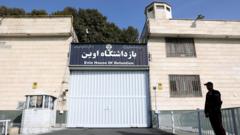A brief overview of the escalating tensions between Israel and Iran post-cease-fire agreement.
Cease-Fire in Turmoil: Israel Accuses Iran of Violation

Cease-Fire in Turmoil: Israel Accuses Iran of Violation
Uncertainty surrounds the cease-fire agreement as Israel claims Iran has breached the truce just hours after it was announced.
As the sun rose over Israel on Tuesday, the atmosphere was tense. The nation found itself grappling with the fallout from a cease-fire agreement declared by President Trump on Monday night, intended to halt the escalating conflict with Iran that had ignited days before. However, mere hours after the provisional truce was announced, senior Israeli officials accused Iran of violating the agreement, raising alarm over the potential for renewed hostilities.
The cease-fire, which President Trump subtitled as "complete and total," was supposed to begin six hours post-announcement, around 7 a.m. local time. While Iranian state media initially corroborated reports of the cease-fire, Israeli military reports contradicted the assertion, indicating that Iranian missile strikes against Israel were ongoing. Shortly after confirming the truce, Israeli forces claimed to have detected additional missile launches from Iran.
In an atmosphere rife with mistrust, Israeli military officials promised to respond decisively to any aggression, despite Iranian media reporting contradictory claims of having ceased all offensive operations. The delicate negotiations surrounding the cease-fire have now plunged into chaos, with uncertainties looming over whether the hostilities will be shelved or resumed in full force.
In the wake of the turbulent news, Trump’s initial statements aimed to pave the way toward peace, commending both nations for their readiness to negotiate an end to the conflict. He asserted that Iran and Israel had one final chance to conclude recent military missions and noted that the cessation of the war would be recognized 24 hours following the cease-fire's commencement. Yet, this conciliatory tone seems to have been overshadowed by the clash of narratives, as both sides present diverging accounts of their intentions and actions as hostilities surge once more.
The cease-fire, which President Trump subtitled as "complete and total," was supposed to begin six hours post-announcement, around 7 a.m. local time. While Iranian state media initially corroborated reports of the cease-fire, Israeli military reports contradicted the assertion, indicating that Iranian missile strikes against Israel were ongoing. Shortly after confirming the truce, Israeli forces claimed to have detected additional missile launches from Iran.
In an atmosphere rife with mistrust, Israeli military officials promised to respond decisively to any aggression, despite Iranian media reporting contradictory claims of having ceased all offensive operations. The delicate negotiations surrounding the cease-fire have now plunged into chaos, with uncertainties looming over whether the hostilities will be shelved or resumed in full force.
In the wake of the turbulent news, Trump’s initial statements aimed to pave the way toward peace, commending both nations for their readiness to negotiate an end to the conflict. He asserted that Iran and Israel had one final chance to conclude recent military missions and noted that the cessation of the war would be recognized 24 hours following the cease-fire's commencement. Yet, this conciliatory tone seems to have been overshadowed by the clash of narratives, as both sides present diverging accounts of their intentions and actions as hostilities surge once more.






















